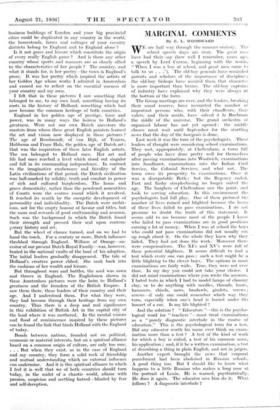MARGINAL COMMENTS
By E. L. WOODWARD
WE are half way through the summer oratory. The school speech days are over. The great mett have had their say (how well I remember, years ago, a speech by Lord Curzon, beginning with the words, " When I was a boy at school, and great men came to talk to us . . ."). The old-boy generals have reminded parents and scholars of the importance of discipline ; the old-boy bishops have assured them that character is more important than. brains. The old-boy captains of industry have explained why they were always at the bottom of the form.
The Group meetings are over, and the leaders, breaking their usual reserve, have recounted the number of important persons who, with their chauffeurs, their valets, and their maids, have solved a la Buchman the riddle of the universe. The grand orchestra of organised labour has not yet opened : the middle classes must wait until September for the startling news that the day of the bourgeois is done.
Last week it was the turn of the psychologists. These leaders of thought were considering school examinations. They met, appropriately, at Cheltenham, a town full of people who have done pretty well for themselves after passing examinations into Woolwich, examinations into Sandhurst, examinations into the Indian Civil Service, the Colonial Services, and what not. The town owes its prosperity to examinations. Once it was a disreputable Bath ; but the Regency ended. Fast and flashy steeplechasing no longer suited the age. The burghers of Cheltenham saw the point, and took to serving education. In this environment the psychologists had full play. One of them pictured the number of lives ruined and blighted because the livers of these lives failed to pass examinations. I do not presume to doubt the truth of this statement. It seems odd to me because most of the people I know who failed to pass examinations are in good positions earning a lot of money. When I was at school the boys who could not pass examinations did not usually cut up rough about it. On the whole they knew why they failed. They had not done the work: Moreover there were compensations. The XI's and XV's were full of these potential blightees. It seems difficult to find a test which every one can pass ; such a test might be a little blighting to the clever boys. The options in most examinations are fairly wide. True, they were not ever thus. In my day you could not take your choice. I did not mind examinations where you wrote the answers. I hated tests in which I had to model lumps of clammy clay, or to do anything with needles, threads, knots, hammers, chisels, saws, bradawls, gimlets, screws ; screws—if only one could remember which way they turn, especially when one's head is buried under the bonnet of a car. Is my life blighted ?
And the solution ? " Educators "—this is the psycho- logical word for " teachers "—must treat examinations as a " purely diagnostic interlude in the course of education." This is the psychological term for a test. Did any educator worth his name ever think an exam- ination more than a test ? A test of the kind of work for which a boy is suited, a test of his common sense, his application ; and, if it be a written examination, a test of describing a thing in plain English, and not in jargon.
Another expert brought the news that corporal punishment had been abolished in Russian schools. A good thing too. But • I should like to know what happens to a little Russian who makes a lOng nose at the 'portrait of Lenin. He is warned, psychiatrically. He does it again. The educator sees him do it. What follows ? A diagnostic interlude ?






































 Previous page
Previous page